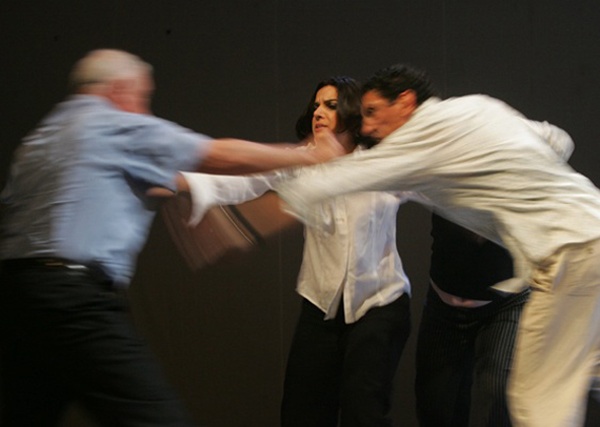REVIEWS,
INTERVIEWS, PREVIEWS
STOCKMAN, AN ENEMY OF THE PEOPLE
BY HENRIK IBSEN
Hand program notes
What you are about to see tonight,
is a version of An Enemy of the People, by the great Norwegian playwright
Henrik Ibsen. We started to work from
the original in Spanish, we made the first editing there. We took one of
the secondary characters out of the play, since, according to our referents,
it would darken the efficiency of the text in our environment. Then we
found the version written by Arthur Miller in the 50’s. This version
was written during a very precise period in the American history, McCarthyism.
The way Miller approached the play, after having worked with Ibsen’s
original, was a revelation. Miller would trim and adjust the passages from
the classic, he translated and fine-tuned the political discourse of the
XX century in an acute way; as well as the debates and the civic and social
ideas brought about by Ibsen. Miller brought all this up to circulation,
to the necessary orbit, as if giving Ibsen the opportunity to talk again,
to provoke scandal, to be polemic and listened to in today’s terms,
using the precise words of today’s social debate, of today’s
forum, or those of his time, to be more exact. Miller would trim all the
rhetorical excess in the play, he would concentrate Stockman’s ideas,
the main character, so that his speech would be as efficient as back in
the XIX century, when the play turned out to be an important forum for
public debate on the conflicting relationship between the individual and
the collective. Miller introduced an important change in the play, the
ending. Out of the two endings, Ibsen’s, more meditating, more philosophical;
and Miller’s more aggressive, we chose the latter. We really worked
with Miller’s tremendous and moving version from the beginning; it
is his homage to his indisputable maestro.
I wouldn’t like to use the word montage to define our work with this
play. I would rather use the word dialog, conversation with Ibsen-Miller.
We had to discuss a lot so that these versions become ours, being credible
and vital; we didn’t want to become simple carriers of another person’s
ideas. What you will see tonight is a long journey of conversations with
Ibsen-Miller, it is us speaking at times, it is also them in other moments.
The whole world is commemorating the hundredth anniversary of Ibsen’s
death, the activities in honor of the great renovator of the European scene
will be multiple and deserved. We wanted to join the general commemoration
with this work, and we do it celebrating, as well, the tenth anniversary
of non-stop work of Argos Teatro.
Carlos Celdrán
Cast
The Family:
Thomas Stockman - Alexis Díaz de Villegas
Peter Stockman - Pancho García
Catalina - Beatriz Viña
Petra - Yailín Coppola
Elij - Yazmany Guerrero
Periodistas:
Hovstad - José Luis Hidalgo
Billing - Fidel Betancourt
Aslaksen - Waldo Franco
Captain Hoster - Danilo Aguilar
Workers:
Andy
Barbosa
Ariel Barreto
Dailenis Fuentes
Equipo de realización
Stage Design: Alain Ortiz
Costume Design: Vladimir Cuenca
Elij's T-shirt: Roberto Ramos
Lighting Design: Manolo Garriga
Make up: Ileana Casas
Sound track design: Carlos Celdrán
Asistant Director: Ileana Rodríguez
Production Manager: Diliara Romero
Administration: Lola Altuna
Props and sound: Alexis Avilés
Stage Machinery: Ernesto García
Taylor: Joaquín Meulener
Video Images: Manolo Garriga
General Director: Carlos Celdrán
Acknowledgements
María Pessino
Jorge Guerrero
Julio Carrillo
Enrique de la Osa
Helmo Hernández
Ludwig Foundation of Cuba
Ramón Casas
Juan Carlos Ricardo
Mayra Góngora
Norwegian Embassy
Raúl Martín and Teatro de la Luna
Ray Gómez y René Gómez
Esther Cardoso

photo: Enrique de la Osa